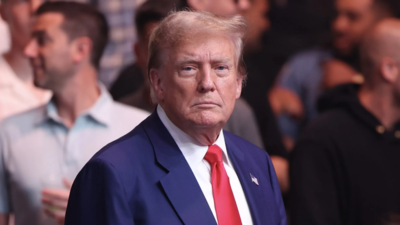TOI Correspondent from Washington: US President-elect Donald Trump on Saturday demanded a “commitment” from Brics nations, which includes China, India, and Russia, that they will not seek to create a new currency or back any other currency to replace the “mighty” US dollar, failing which he warned they would face 100 per cent tariffs and be denied access to the “wonderful” US economy.
The provocation for Trump’s sudden tirade was not immediately clear, but several skeptics of the long-term viability of the US economy based on the dollar’s dominance have discreetly begun exploring other currencies and methods for global trade. The move is driven by Russia, which is suffering from crippling US sanctions, and China, which hopes to displace the US as the pre-eminent power in the world.
The expanded Brics alliance includes Brazil, Russia, India, China, South Africa, Egypt, Ethiopia, Iran & United Arab Emirates. Turkey, Azerbaijan and Malaysia have applied to become members and several other countries have expressed interest in joining the grouping which now accounts for 35 per cent of the global economy based on purchasing power parity, overtaking the 30 per cent share of the G7 developed nations in recent months.
In an abrupt social media post without preamble, Trump appeared to fire a warning shot against the group’s recent deliberations on “de-dollarisation,” saying, “the idea that the Brics Countries are trying to move away from the Dollar while we stand by and watch is OVER.”
“They can go find another “sucker!” There is no chance that the Brics will replace the US Dollar in International Trade, and any Country that tries should wave goodbye to America,” Trump said, adding that the US requires “a commitment from these Countries that they will neither create a new Brics Currency, nor back any other Currency to replace the mighty US Dollar or, they will face 100% Tariffs, and should expect to say goodbye to selling into the wonderful US Economy.”
The dollar’s unique status and primacy rests on the perception of America being a stable, reliable bedrock of global politics and business, something that is being called into question in recent years in the face of mounting US debts and deficits, and political uncertainty and gridlock. Despite challenges, the dollar continues to reign supreme, accounting for more than 58.36% of official foreign exchange reserves across the world because of its scale and liquidity, and the perception of US as a stable society with a mature economy. The euro is currently the second most commonly held reserve currency, representing about 20% of international foreign currency reserves.
Most US experts see no immediate threat to the dollar. The last time the world switched its reserve currency from the British pound to the American dollar some 80 years ago, the transition was relatively seamless because the US and UK were allies, but even with the adversarial relationship Washington faces with Beijing and Moscow, they reckon the dollar is safe although Trump’s sudden ferment suggests he sees some discomfort as he comes into office for a second term.
